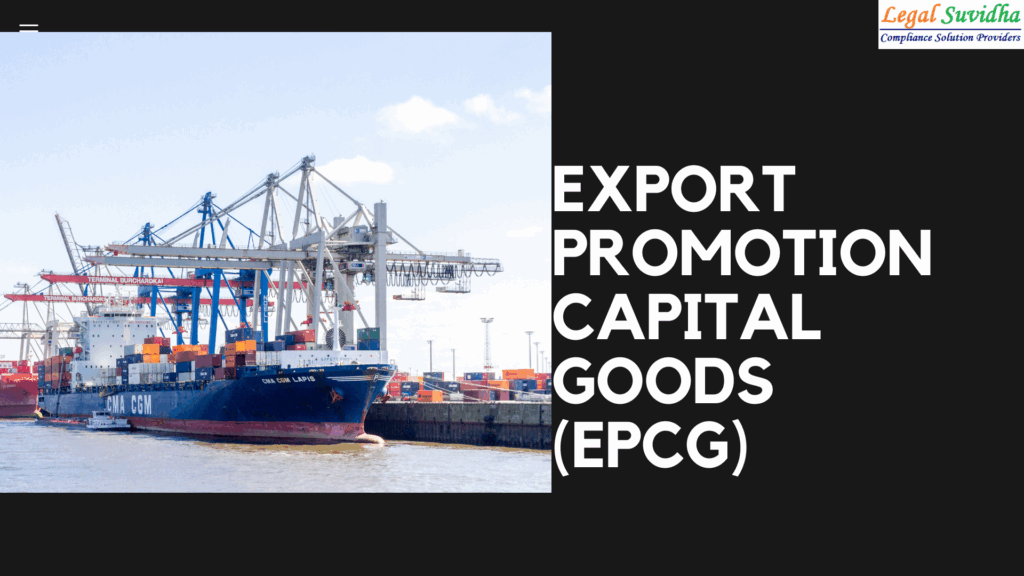Export Promotion Capital Goode Scheme is a policy in India that allows the import of capital goods for production of goods for exports, without payment of the basic customs duty and integrated tax (GST) that would normally be applicable
EPCG Scheme was launched in the 1990s to facilitate the import of capital goods with the aim to enhance the production quality of goods and services, thereby, increasing India’s international manufacturing competitiveness. This is a scheme relating to the import of capital goods at Zero duty. The benefit of zero duty is subject to the fulfillment of export obligations and other conditions.
PURPOSE OF THE SCHEME
To facilitate the import of capital goods for producing quality goods and services to enlarge India’s Export competitiveness.
1. Import capital goods by enjoying the zero-duty benefit first and then fulfilling the export obligation conditions within the stipulated period. This is called Pre-Export EPCG
2. Post Export EPCG: Under this, capital goods are imported first by paying import duty, then remission (refund)of import duties is claimed after fulfilling an export obligation
3. EPCG Scheme for capital goods purchased in India.
ELIGIBILITIES
Capital goods’ has been defined under FTP. Such capital goods eligible must be used as per the eligibility conditions.
CONDITIONS
- The scheme is subject to actual user condition and a certificate of installation in own premises shall be produced from Excise Dept./ other authorities.
- Import must be made within 18 months of date of issue of authorization and no extension is granted.
- Even the capital goods under the scheme are not transferable till the Export obligation is fulfilled.
- The importer has to achieve an export turnover of 6 times the amount of import duty saved within 6 years of authorization.
Capital Goods defined: ‘ Means any plant, machinery, equipment or accessories required for manufacture or production, either directly or indirectly, of goods or for rendering services,including those required for replacement, modernization, technological upgradation or expansion.
It includes packaging machinery and equipment , refrigeration equipment, power generating sets, machine tools, equipments and instruments for testing, research and development, quality and pollution control Capital goods may be for use in Manufacturing, Mining, Agriculture, Aqua culture, Animal husbandry, Floriculture, Horticulture, Pisciculture, poultry, sericulture and viticulture as well as for use in services sector.
BENEFITS FROM EPCG SCHEME
EPCG is intended for promoting exports and the Indian Government with the help of this scheme offers incentives and financial support to the exporters.
Heavy exporters could benefit from this provision. However, it is not advisable to go ahead with this scheme for those who don’t expect to manufacture in quantity or expect to sell the produce entirely within the country, as it could become almost impossible to fulfil the obligations set under this scheme.
What are other Schemes to Promote Export
Merchandise Exports from India Scheme: MEIS was introduced in the Foreign Trade Policy (FTP) 2015-20, under MEIS, the government provides duty benefits depending on product and country.
DOCUMENTS REQUIRED FOR EPCG LICENSE
Director General of Foreign Trade (DGFT), The licensing authority is the issuing authority. The following documents must be self-certified and attached to the DGFT portal:
- GST Registration
- Chartered Accountant Self-Certified Copy and Original Certificate of CA need to be attached.
- IEC (Import Export Code)
- Brochure
- Digital Signature
- Excise Registration
- Proforma Invoice
- Chartered Engineer Self-Certified Copy and Original Certificate
- PAN Card
- Registration Cum Membership Card
- Registration certificate from Tourism Department



![Received an Income Tax Notice in India? Don’t Panic — Here’s Exactly What to Do [2025 Guide] 2 Income Tax Notice](https://legalsuvidha.com/wp-content/uploads/2025/12/Income-Tax-Notice.png)
![Cyber Crime FIR in India: How to File Complaint for Online Fraud, Banking Fraud & Digital Harassment [2025 Guide] 3 Cyber Crime Complaint](https://legalsuvidha.com/wp-content/uploads/2025/12/Cyber-Crime-Complaint.png)
![Trademark Infringement in India: How to File Legal Action & Protect Your Brand [2025 Guide] 4 Tradenark Infrigement](https://legalsuvidha.com/wp-content/uploads/2025/12/Tradenark-Infrigement.png)



